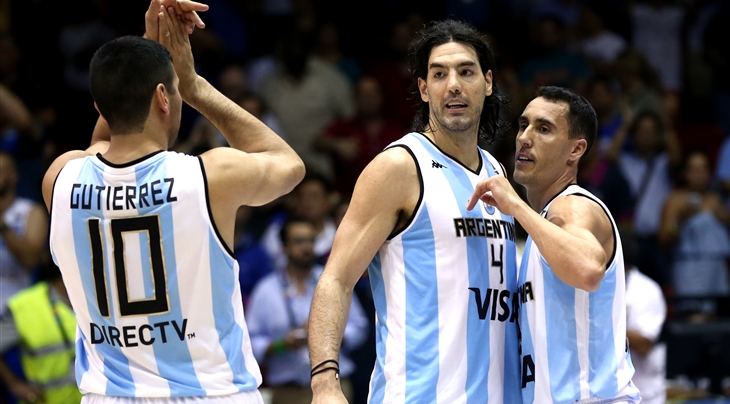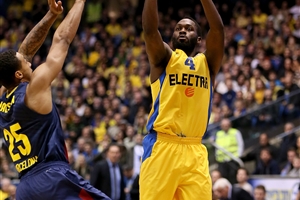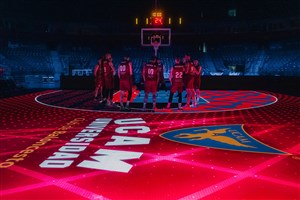
King Leo
SAN JUAN (William Rosario's Somewhere in the Americas) - Argentina has produced some of the best international players in the world over the last 15 years. Their Golden Generation some argue should be inducted as a team in the Naismith Memorial Basketball Hall of Fame. I agree. But not only because of the obvious big superstars of the team like Manu Ginobili, Luis Scola, Andres Nocioni, Pablo Prigioni, Carlos Delfino, Fabricio Oberto or Pepe Sanchez. They are legendary and undisputable in terms of their greatness.
But I would argue for their induction on the fact that they had some fantastic not so famous players that deserve some praise. One through twelve the team had all-time great talent like Walter Herrmann, Ruben Wolkowyski and the player I’m dedicating this column to, Leonardo Gutierrez.
For some of you that don’t know the kind of curriculum that Leo Gutierrez brings to the table, I will summarize it by pointing out that he may be the great winner out of those twelve guys that won the gold in Athens 2004.
It may read as some crazy hyperbole but outside of Ginobili (who in my opinion is the best international player of all-time), Leo’s winning percentage is unmatchable. He has simply won everywhere he played. His career began in the Olimpia de Venado Tuerto club in Argentina in 1993 as a 15 year old and two years later, he had won his first National League title with the club.
To see him on the court is to see the personification of what a big heart can do to overcome talent deficiencies in the game. Leo is not the fastest, strongest or more athletic player on the court. But he’s always fiery, full of intensity and unafraid to get into it with anybody, even teammates. He’s raw in every sense of the word. But he’s a natural born leader and a sharp shooter with a flair for the dramatic. He wants the big shot.
Leo has won a total of 10 Championships in the National League of Argentina, with five different teams now over the span of three decades. He’s also been the MVP of the league four times and the MVP of the Finals also four times.
Add to that the international club competitions of which he has won the Sudamericana twice and the Liga de las Americas in 2010. He also won the now extinct Panamerican Club Championship in 2000.
His debut with the national team came in the South American Championship in 1999, with those big names that I mentioned earlier and it has been stellar to say the least. There have been three gold medals, a silver and a bronze in the South American Championship; two golds, three silvers and one bronze in the FIBA Americas Championship; one silver medal at the 2002 FIBA World Championship; and one gold and one bronze medal at the Olympic Games.
Leo’s legendary status has been achieved in great part due to his loyalty to Argentinean basketball. This will now be his 21st professional season with all of them being played in Argentinean soil. The international offers must have been there at one point. They came for every Golden Generation member, but for some reason he did not even tried it. And he’s revered for it in his country.
I’d like to pause to add two quotes that his former coach, 2008 Beijing bronze medalist Sergio “Oveja” Hernandez, gave to Argentinean website Basquetplus a couple of years back:
"Leo Gutierrez never ceases to amaze me. Even now when he should not catch me off guard. But today (2012), he is the engine of the team. He motivates everybody at all times. There is no game or practice in which he does not give a hundred percent. It does not matter how big or small the game is. It's hard to find players that play 40 minutes without giving an inch. However, he’s always at full capacity."
"I am very respectful of history. It is like the Messi is better than Maradona or Messi will be better than Maradona argument. The two are geniuses. In our national league basketball history, (Marcelo) Milanesio was a genius. (Hector) Campana was a genius. (Diego) Ossela was a genius. And Leo is also a genius. All I know is that today he is the best. There is no doubt. Sometimes you have to sit back and think for a second as if Leo was retired. He has some years in him, but let’s imagine he is retired. If you look at what he did in his career, he has no competitor. He was champion in Venado Tuerto, in Athens, Boca, Ben Hur and now Peñarol. And in the last 10 years, he has been the undisputable leader of the team, with everything that comes with it. There's nothing to say, we are talking about a one of a kind, different player, and I’m thankful for having coached him."
In 2013, everybody said he was done. Then, last year, with a Peñarol no longer coached by Hernandez and a young great point guard in Facundo Campazzo, Leo did it again and won the championship.
This weekend he comes back to the Liga de las Americas with Peñarol. He’s older and it’s hard for him to keep up on the defensive of the court, but he’s still the motor of the team. For a 36 year old that has done it all inside the court, that’s quite the feat. You can’t help but admire his achievements and eternal dedication to being great, to being a winner.
All hail King Leo.
William Rosario
FIBA
FIBA's columnists write on a wide range of topics relating to basketball that are of interest to them. The opinions they express are their own and in no way reflect those of FIBA.
FIBA takes no responsibility and gives no guarantees, warranties or representations, implied or otherwise, for the content or accuracy of the content and opinion expressed in the above article.

















